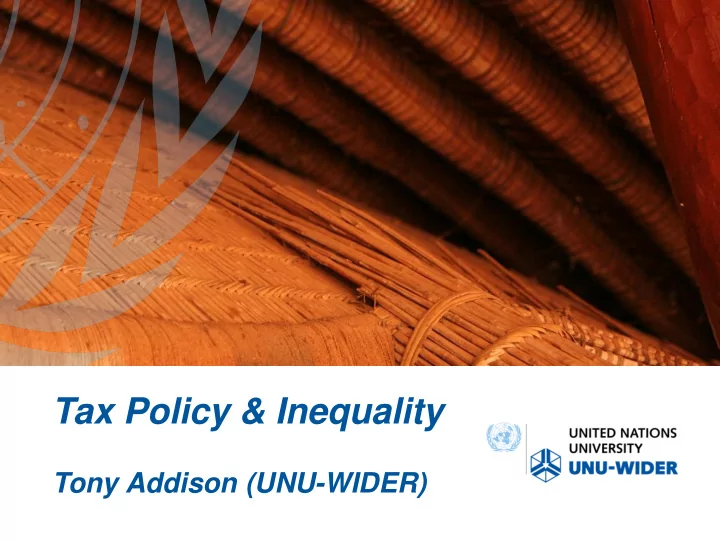

Tax Policy & Inequality Tony Addison (UNU-WIDER)
Multiple Goals for Tax Policy • Revenue raising, Redistribution (inequality), Environmental Externalities, Private-Sector Development (‘Industrial Policy’) etc. Can conflict with each other. • Most (all?) tax systems are the result of changing political priorities over time, inc. over inequality • ‘For too long… tax reforms have been approached ad hoc , without regard to their effects on the evolution of the tax structure as a whole. As a result many parts of our system seem to lack a rational base. Conflicting objectives are pursued at random; and even particular objectives are pursued in contradictory ways’ (Director, UK’s Institute for Fiscal Studies, 2011).
History Matters : Inequality Tax • Example: Latin America’s income taxes smaller % of total taxes compared to similar countries & to North America – colonial histories • Often starts with land inequality (i.e. productive assets): different patterns of land ownership => different structures of political power => fiscal incidence (tax/spending). • High thresholds on income tax. Many countries have multiple (& opaque exemptions ) benefiting higher- income groups. • Wealth taxes : Political mobilization by wealthy (collective action). Media framing of debate.
Revenue Mobilization & Composition (Lustig 2017)
Source: ICTD – UNU WIDER GRD
International Development debate focuses on Revenue Raising Goal • Lot tax policy goals, but revenue goal pre-eminent in debate • MDGs seen mainly through the prism of social spending (health, education etc.) => less inequality in HD outcomes & perhaps incomes (if more human capital formation among poor). Delivered: Real achievements inc. in inequality of health outcomes (children especially) • => Maximize domestic revenues to finance spending (especially in recent years as aid stalled. Pushed hard by donors themselves). • But low per capita income does set an upper bound on revenue mobilization – do need (sustainable) economic growth
Source: ICTD – UNU WIDER GRD
SDGs cont • SDGs still have social spending focus, though more attention now to job creation (influence of Arab Spring, ‘Jobless Growth’ etc.) • This debate continues long-standing concentration on livelihood creation via community development/small (informal enterprise). Great! • But too little attention to job creation via creation of medium/large firms (’superstars’) & role of tax policy in helping shape this (distrust of formal private-sector) => less income inequality via rapid wage & job growth (see S.Korea, Vietnam etc.) • Tax/GDP ratio focus of attention. Rising ratio celebrated. Good if it rises via better & fairer tax institutions (+ compliance), more tax of (bad) environmental externalities etc • BUT not good if Tax/GDP rises due to: distortionary taxes that hit growth & jobs. Or via more taxation of poor people (without commensurate service delivery, or ignores the bigger “ tax fish ” in removing exemptions, getting extractives taxes right)
Quality of Economic Growth • Is growth process inclusive or exclusive ? (does it create many good livelihoods? -- or not?) • Exclusive growth – economies driven by extractive industries (e.g. offshore oil) & few ’growth poles’ • High spatial inequality : stagnant, rising & declining areas (globalization). Issue for ALL countries : LICS, MICs, HICs
Resource Wealth & High Inequality Societies • Many: lack of a social contract between state & citizen <=> opaque tax-spending system (also reluctance to create non-resource revenue taxes) • Citizens have little knowledge about fiscal incidence (what their taxes pay for) • A few resource-rich countries have diversified their revenue bases (cutting revenue risk ) & improved human development but still up against hard constraints (agric. potential, location etc.). Botswana, Namibia: high & rising inequality
Source: ICTD – UNU WIDER GRD
Redistribution via Tax/Spending • Use tax-benefit system to redistribute: more pressure to do this in exclusive growth countries • But demanding on government capacity (& also data/analysis – need to understand net fiscal incidence ) • Need it most in societies that are politically least likely to do it ( Resource-rich countries – often no attempt to build a fiscal contract between state & citizen) • Democratic politics in HICs, MICs very much focused around net fiscal incidence & tax level/composition to achieve it (but in context of often low-quality growth)
Redistribution via Fiscal System • Trying to deliver Redistribution via fiscal system in context of: • Changing Composition in Tax Sources over time: VAT etc, personal Income tax, corporate tax, extractives (& non-tax revenues like user charges). • Impact of globalization : placing limits on national policy, increasing need for more international cooperation, BUT expanding scope for growth (& total revenues) if your economy integrates into the global economy in a ‘smart’ way.
Falling Corporate Tax Rates
Global Tax Avoidance • Tax avoidance by corporates via profit shifting across tax jurisdictions, Use of Tax havens etc • Crivelli, de Mooj, Keen (IMF) : $650 bn (annually) • Cobham & Jansky. (WIDER) : $500 bn (annually) • But balance in tax policy needed for private-sector to create more livelihoods (i.e need MNCs to invest before you can tax them) • => Increased pressure on revenue mobilization via user fees, indirect taxes, personal income tax etc
Avg.: 6.1% Source: ICTD – UNU WIDER GRD
Transparency: Why? Unfair Tax Burdens • Need transparency in public spending system • Otherwise, taxation system can be viewed as unjust (leading to grievances over who bears burden ) • Need transparency in revenue system • Transparency is central to accountability – to the legislature but also citizens (tax-payers) => compliance • Finland : public aware of how the fiscal system redistributes <=> trust in tax system => high compliance
Tax simulation supports governance
Summing up: 3 issues for future • Revenue volatility : from extractive sectors (commodity-price volatility), business-cycle (over- dependence on few revenue sources), climate change etc => affects ability to address inequality • International Corporate Tax Avoidance : inflexion point? More international co-operation? • Demographic change : ‘young’ v ‘ageing’ societies – how this affects revenues (& inequality). Demographic ‘dividend’? Young people finding only livelihood in (untaxed) informal sectors
https://www.wider.unu.edu/data
www.wider.unu.edu Helsinki, Finland
Recommend
More recommend